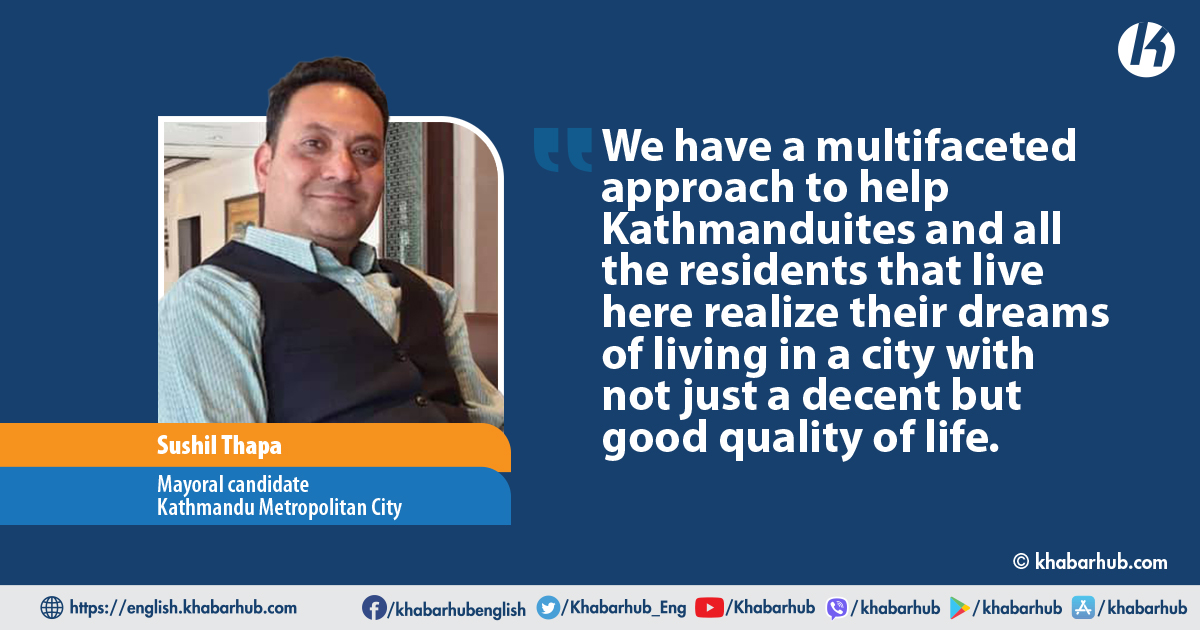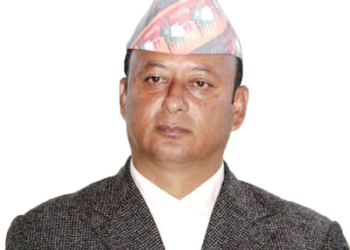KATHMANDU: Sushil Thapa is an independent candidate for the post of mayor in the Kathmandu Metropolitan City.
He says he is “devoutly committed” to building a strong and developed capital city that is unimaginable without the trust and the unflinching support of the people of Nepal.
Talking to Khabarhub, he shared his plans and future strategies if he gets elected as the mayor of the Kathmandu Metropolis in the May 13 local elections. Excerpts:
Why do we think people should elect you as the mayor of Kathmandu?
Kathmandu Metropolitan City (KMC) is a large organization that needs a CEO with management competence, that looks at systems, systems change, and systems maneuver.
And I believe, as a mayoral candidate, I have all the required qualifications and 30 years of experience.
Rinku Shrestha, our deputy mayor, has specialized in working on the front end and has served with the Man Mohan Hospital and HAMS hospital.
She has 30 years of experience with systems from the front end dealing with what the customers and clients need and guaranteeing their satisfaction.
Both are systems-based specialists, where I would be working on processes (pranali) and Rinku with customers’ interfaces.
Moreover, both of us are systems managers with a history of delivering healthcare. Therefore, we have given our candidacies to heal Kathmandu.
If elected, what would be your three most important strategies and major priorities?
We have 4 pillars that we will be working on but within them, the three things that we have identified as the most important are waste management, air pollution control, and working behind the scenes to make KMC and all its systems transparent, efficient, and functioning.
Let me elaborate: The first thing we are going to focus on is waste management. We will develop system solutions with all stakeholders in mind because we cannot simply collect our waste and keep dumping it in rural Nepal.
That is not a solution but just a temporary fix. We have to incorporate modern and proven technologies to segregate waste, treat them, and eventually work on a zero waste solution.
This is not just something to make us sound likable, we will be using industry leaders at home and abroad to resolve Kathmandu’s long-ignored waste management problem.
Many cities and countries have proven that moving towards a zero-waste solution is actually more cost-effective than our current temporary fixes, and also helps in creating jobs for the local economy.
The second thing on our priority list is air pollution control. Kathmandu is consistently topping the list of the most polluted cities in the world.
Our air pollution is an immediate concern and also has some quick and effective solutions. We already have plans and systems developed to focus on particulate emission control from vehicles, dust pollution control from construction, safe and dependable mass transit systems, and traffic management.
While the first two are things that are visible, and as I said earlier, we will also be working behind the scenes to make KMC and all its systems transparent, efficient, and functioning.
This will require many town hall meetings after the elections. Right now we only have town hall meetings and ghar dailo (door-to-door) events just before the elections.
The purpose of interactions with citizens and residents is to identify what are the problems that afflict them, not just votes. If we have to sum up our goals, we will be dealing with all the illnesses of Kathmandu with a systems approach.
What are your plans to do socially, economically, and politically, to make Kathmandu one of the best cities?
Socially, we want to make Kathmandu vibrant again. We want to revitalize the cultural and historic heritage of this once glorious city.
Kathmandu for quite a long time was a magical Shangri-La. I believe we can, and we have to raise Kathmandu back to its previous status.
Economically, Kathmandu is missing out on being one of the top 10, if not the best, destinations in the world.
Kathmandu does not lack any cultural, architectural, historic, or romantic experience. Kathmandu has been before and it can again become one of the top tourist destinations in the world.
Similarly, Kathmandu’s pollution is not just limited to our physical environment but also our political environment.
We need to create a political will and engagement from all demographics that make Kathmandu a better place.
Kathmandu has to be transparent and drastically increase our civic engagement. This is not easy but it is doable and critical.
How does your experience help you to work towards your vision?
The mayor of Kathmandu does not need to worry about national policy and politics.
In Nepal’s federal system, the position of the Mayor is an executive position. I have 30 years of proven experience in management and quality systems.
This directly translates to implementing our vision for Kathmandu. Why our and not my vision, because I am not running this election alone. I have a running mate in Rinku Shrestha who also has 30 years of experience in management systems.
We are not just trying to win; we have a team ready to implement all our visions for Kathmandu in a systematic and professional process.
What are your plans to eliminate corruption in local government?
Corruption, like pollution, has both internal and external components. We need transparency, and encourage and support investigative journalism.
We will facilitate public interest litigation to make sure the pressure is from the internal and external forces.
How can you make Kathmanduites realize their dreams of a city where they can enjoy a decent quality of life?
We have a multifaceted approach to help Kathmanduites and all the residents that live here realize their dreams of living in a city with not just a decent but good quality of life.
A politically and socially engaged city where we value modern advancements without neglecting our history and culture is what our objective is. We want to preserve our souls and revive our bodies.
What policies and virtues do you espouse when it comes to good governance?
This is the easiest to answer and many will say the hardest to implement. It is the transparency, responsibility, accountability, participation, and responsiveness.
The problem is the political will to enact these simple things in our governance. In my 30 years of working experience in management, I have implemented this in every organization I have run.
These are simple, yet critical things that are needed to manage a corporation. I look at Kathmandu as a corporation and these 5 points have to be implemented for Kathmandu and it will also set an example for other municipalities to follow.









Comment